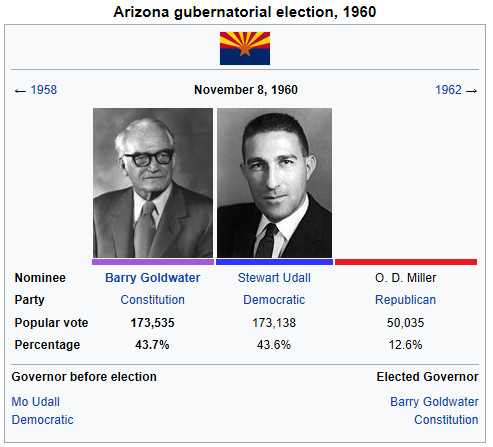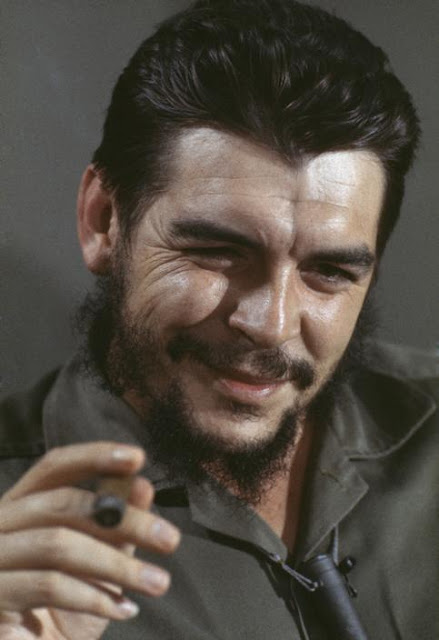Update 24: 1960 Arizona gubernatorial election
Gentleman Biaggi
Banned
In 1958 the Democrats had gone on a sweep by the Democrats. The Democrats swept all national or statewide offices, as the recession was hurting the state. Incumbent Barry Goldwater was swept by Evo Anton DeConcini and representative Stewart Udall easily beat no-name Republican opposition. However, by 1960, it began to seem like Udall wasn’t attending to the needs of the state. Because of this, it seemed like he could be easily defeated by the Republican Party. However, when the Constitution Party was created, everything changed.
When the Constitution Party was created, former Arizona Senator Barry Goldwater decided against becoming Fabus’s running mate to instead form a Arizona wing of the Constitution Party. Because of that, he was quickly nominated by the Constitution Party to be the party’s nominee for governor against Udall. The Republicans nominated state senator O.D Miller, who would have a small effect on the race. Udall was easily renominated by his own party
Goldwater spent his campaign attacking Udall for “putting the state in a bad economic situation” and declaring that “We’ve seen how the old way of doing business has affected our great state, it’s time to see what new ideas can do.” Goldwater used much of the same tactics he used to defeat Ernest McFarland. He toured around the state, making speeches and attacking Udall. However, Udall was no slouch either. At one point he was losing 50% to 30% to Goldwater (Miller/Other/Not Voting/Undecided had 20%). So Udall challenged Goldwater decided to a television debate. Goldwater accepted, and during the debate, Udall questioned about Goldwater’s position on Civil Rights. Civil Rights was an important issue in Arizona, as the state had large populations of Mexican-Americans and Native Americans. Considering Goldwater’s position on Civil Rightswas… complicated (he was a founding member of the Arizona chapter of the NACCP, but opposed some parts of Civil Rights reform because of his libertarianoutlook.) Goldwater stated that Civil Rights didn’t matter because of the economic problems facing the state. a botched attempt to keep both the support of the Constitution Party and minorities (alternatively people of color) in Arizona. This perceived waffling enraged both Constitution Party hardliners (who felt that they wouldn’t be getting a true conservative) and minorities (who feared Goldwater wouldn't accept them).
Following the debates, Udall and Miller received poll boosts. Udall used his boost to campaign around the state, particularly in heavily Native American or Mexican-American areas. Racial tensions were further stroked when flyers were passed around in heavily White areas that stated that Barry Goldwater had started the Arizona NACCP supposedly in hopes that it would depress turnout from potential Goldwater supporters. It was believed that this was the Udall or Miller campaign that did that, but in reality, staffers for Mississippi governor Carroll Gartin passed them around. Gartin felt Goldwater wasn’t a true conservative and wanted to elect Udall so that a more right-wing member of the Constitution Party could beat him in 1962. In the end, the polls showed a razor-thin result. Would Goldwater collapse? Would Udall unexpectedly come back? In the end, it was all up to the people of Arizona to decide their fate.

The election was decided in Goldwater's favor by three hundred and ninety-seven voters. Udall considered asking for a recount, but he was saving his energy and influence for the 1962 gubernatorial election. The newly-triumphant Constitution Party swept the state house and managed to prevent any party from forming a majority in the senate. The election would change Arizonian politics forever, as it began a new state party system.
When the Constitution Party was created, former Arizona Senator Barry Goldwater decided against becoming Fabus’s running mate to instead form a Arizona wing of the Constitution Party. Because of that, he was quickly nominated by the Constitution Party to be the party’s nominee for governor against Udall. The Republicans nominated state senator O.D Miller, who would have a small effect on the race. Udall was easily renominated by his own party
Goldwater spent his campaign attacking Udall for “putting the state in a bad economic situation” and declaring that “We’ve seen how the old way of doing business has affected our great state, it’s time to see what new ideas can do.” Goldwater used much of the same tactics he used to defeat Ernest McFarland. He toured around the state, making speeches and attacking Udall. However, Udall was no slouch either. At one point he was losing 50% to 30% to Goldwater (Miller/Other/Not Voting/Undecided had 20%). So Udall challenged Goldwater decided to a television debate. Goldwater accepted, and during the debate, Udall questioned about Goldwater’s position on Civil Rights. Civil Rights was an important issue in Arizona, as the state had large populations of Mexican-Americans and Native Americans. Considering Goldwater’s position on Civil Rightswas… complicated (he was a founding member of the Arizona chapter of the NACCP, but opposed some parts of Civil Rights reform because of his libertarianoutlook.) Goldwater stated that Civil Rights didn’t matter because of the economic problems facing the state. a botched attempt to keep both the support of the Constitution Party and minorities (alternatively people of color) in Arizona. This perceived waffling enraged both Constitution Party hardliners (who felt that they wouldn’t be getting a true conservative) and minorities (who feared Goldwater wouldn't accept them).
Following the debates, Udall and Miller received poll boosts. Udall used his boost to campaign around the state, particularly in heavily Native American or Mexican-American areas. Racial tensions were further stroked when flyers were passed around in heavily White areas that stated that Barry Goldwater had started the Arizona NACCP supposedly in hopes that it would depress turnout from potential Goldwater supporters. It was believed that this was the Udall or Miller campaign that did that, but in reality, staffers for Mississippi governor Carroll Gartin passed them around. Gartin felt Goldwater wasn’t a true conservative and wanted to elect Udall so that a more right-wing member of the Constitution Party could beat him in 1962. In the end, the polls showed a razor-thin result. Would Goldwater collapse? Would Udall unexpectedly come back? In the end, it was all up to the people of Arizona to decide their fate.
The election was decided in Goldwater's favor by three hundred and ninety-seven voters. Udall considered asking for a recount, but he was saving his energy and influence for the 1962 gubernatorial election. The newly-triumphant Constitution Party swept the state house and managed to prevent any party from forming a majority in the senate. The election would change Arizonian politics forever, as it began a new state party system.
Last edited:

